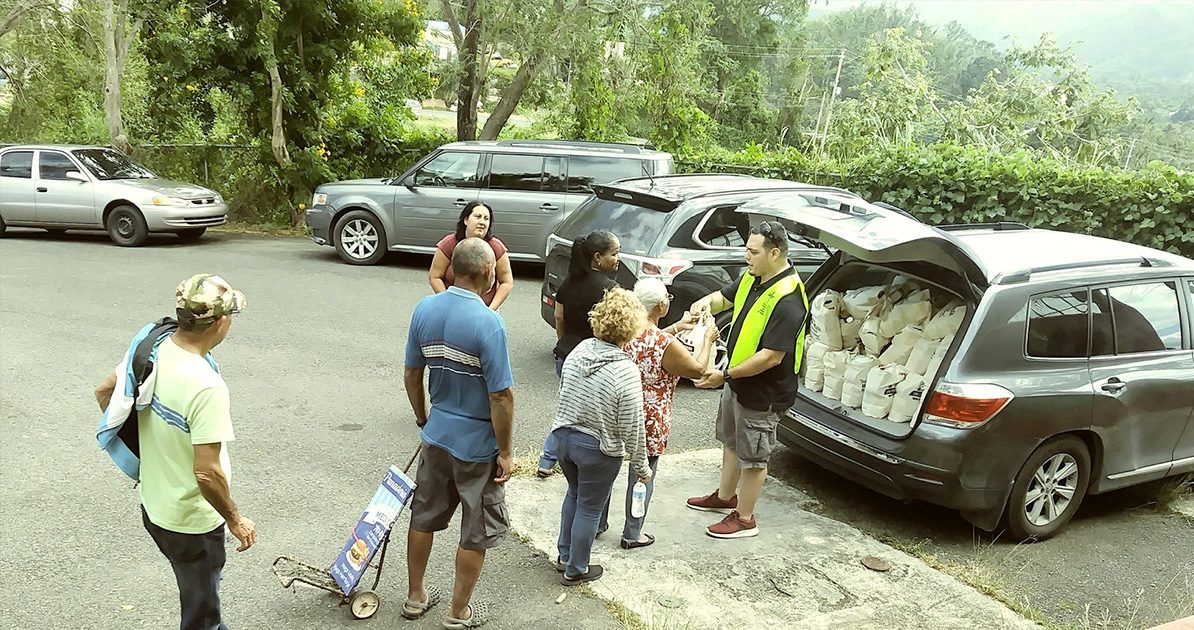
Six months after Hurricane Maria battered Puerto Rico and other parts of the Caribbean, LCMS missionaries and disaster workers have purchased and readied buildings to serve as disaster-response centers in two of the island’s three-largest cities: Ponce and Mayaguez.
Although aid from LCMS Disaster Response has been distributed to those who need it since the Sept. 20, 2017, storm did its damage and moved on, the two new centers signal a sense of permanence — a concrete-and-mortar sign that Lutherans won’t be stopping that work anytime soon.
The Rev. Dr. Ross Johnson, who heads the Synod’s relief arm, expects that the church body’s aid to Puerto Rico will exceed $1 million over some four years. A total of $182,000 has gone to support the effort so far.
Puerto Rico is one of two current disaster areas receiving long-term Synod support — the other is Hurricane Harvey–pounded Texas.
The new “mercy centers” have been dubbed “CARD” for Casa de Amparo y Respuesta a Desastre (House of Refuge and Disaster Response). Open since late February, they are dispensing food, water and other supplies — including baby items such as diapers, wipes and formula.
Both are situated near Lutheran congregations offering opportunities for spiritual counseling, Bible study and worship. And that’s no accident, adds Johnson, since it enables responders to help with “earthly needs” and “address the spiritual crisis of hopelessness.”
Through that mercy work, Lutherans are “connecting with people and providing spiritual care and hope that only Christ can bring in the middle of tragedy,” he notes. “We are seeing new faces in church and we have begun new adult catechism classes.”
Puerto Ricans, Johnson adds, “are finding a peace which surpasses all understanding,” and Lutherans are “connecting with people who would have never talked to pastors or missionaries before the storm.”
Particularly hard-hit was the congregation in Mayaguez, Principe de Paz (Prince of Peace), which lost several families that returned to the U.S. after the hurricane.
The Ponce church, Fuente de Vida (Fountain of Life), began offering worship services in mid-February and has a dozen regular members. It’s possible that a third Lutheran church may be planted north of Mayaguez in the coming year.
“Poverty has increased” in Puerto Rico since the storm “and physical needs are still great,” particularly the task of repairing and rebuilding homes, according to LCMS Area Facilitator Rev. Charles St-Onge, who works with Johnson to oversee the island’s disaster-response effort.
St-Onge points to FEMA statistics showing that 55,692 temporary roofs have been installed over the past six months, with “the permanent fixes … yet to begin.”
Also needed — and expected to take years to acquire — are solar panels, generators, water purifiers and other equipment considered invaluable in the wake of future storms.
Add to those needs the “shaky” power grids that provide electricity — usually, but not always — on most of the island, while residents in interior areas are “still waiting for power to be restored,” says St-Onge. Some traffic lights in major cities like Ponce and Mayaguez, he adds, “are still not functioning.”
But in spite of the hardships, or maybe because of them, St-Onge says “our proclamation of how the mercy of Christ — the foretaste of the new creation in the midst of the fallen one — leads to the forgiveness of sins and the promise of resurrection, is resonating after these hurricanes.”
Adults are preparing for confirmation, and Baptisms are being planned. Puerto Ricans are attending worship services and Bible studies. Lutheran missionaries are offering counseling and reaching out to local youth. And they are continuing distributions of food, water and other needed supplies — totaling nearly $2,000 a week — often delivering them door to door.
And “there is no shortage of repair work that still needs to be done,” notes St-Onge, who looks forward to seeing new short-term and career missionaries “arriving soon, if all goes according to our plan.
“But the Lord knows what His plan is,” he adds, and, in the meantime, “we are just trying to keep up.”
lcms.org/disaster
Posted April 9, 2018